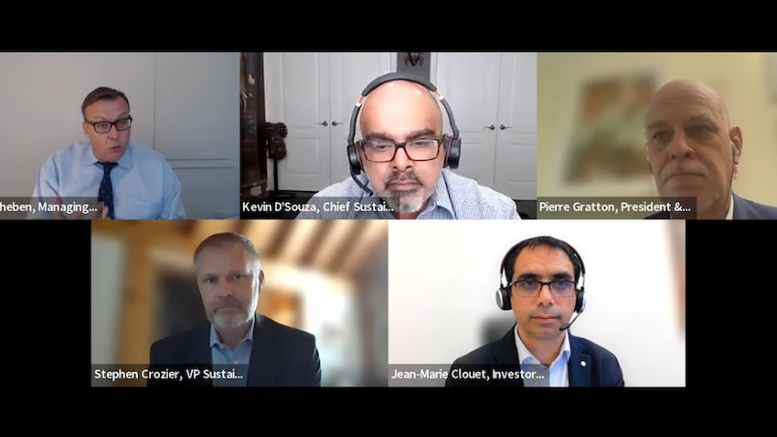The future of environmental, social and governance (ESG) issues in the mining industry will see Indigenous communities commonly hold equity stakes in projects while companies become fully transparent about all operations, not just information to meet laws. These were just a couple of points to come out of a six-person thought-leadership panel on ESG presented by SLR Consulting at The Northern Miner’s Q3 Global Mining Symposium last week.
Mining companies are spending billions on ESG as movements such as Black Lives Matter, climate change activism and Indigenous rights gather momentum through social media and a generational shift in attitudes towards corporate responsibility. And the federal government is offering tax credits for adopting net-zero technologies and carbon capture concepts, as well as $600 million for a renewables and electrification program as part of the up to $3.8 billion announced this year to boost critical minerals mining.
“The needle is moving and now faster than ever before,” Kevin D’Souza, chief sustainability officer with Resource Capital Fund, said during the 45-minute session. “The themes that we won’t have seen really on our radars up until a few years ago, you know, diversity and equity inclusion is one that’s really come full speed.”
Panelists in the session, moderated by SLR managing principal Stephan Theben, said the industry has been proactive in ESG for decades although the goalposts have moved in many issues as wider society becomes more aware and demanding. They cautioned that there was no going back to transgressive times and that mining companies must fully adopt ESG measures in their culture to avoid accusations of greenwashing, when companies follow fake or misleading ESG policies for the sake of image.
Stephen Crozier, vice-president sustainability at Ring of Fire Metals, told the session there’s an industry-wide tension concerning how much information about operations companies should share with the public. The public won’t settle just for disclosures to meet laws, so companies had better prepare, he said.
“We are set up for a collision here, which doesn’t have to be, you know, a destructive collision,” Crozier said. “But there is still a big tension here, and the reluctance to be more specific and more transparent at sites is currently not helping. The sooner it is addressed, the better because it’s inevitable that it will have to be addressed.”
Diversity and inclusion have become buzzwords in recent years of upheaval after the death of George Floyd in the hands of police in the United States, the revelations of unmarked graves at residential schools for Indigenous children in Canada, and the wider acknowledgement of trans people, among other LGTBQ issues. That inclusion is now broadening to more calls for mining companies to give local communities, especially Indigenous communities, equity stakes in projects, Resource Capital’s D’Souza said.
“In the near future, I really do expect to see community and Indigenous community equity in mining projects,” he said. “That’s true partnership going forward. And that’s where this new ESG approach is fundamentally seen as creating that sustainable culture, not just financial.”
Issues such as gender parity are gaining traction, yet Pierre Gratton, president and chief executive officer of the Mining Association of Canada, noted how skilled trade schools channel fewer women than men into the mining work force.
“We do need to work with the schools to try to convince many more people and visible minorities as well,” Gratton said. “A lot of immigrants come to Canada, they never think of working in the mining sector, tend often to congregate primarily in urban areas, and our jobs are, many of them are not in urban areas.”
Creating value for communities
Part of the transformation required among mining companies is to move away from lingo such as social licence and toward concepts such as creating value for communities.
“A social licence is solely about benefit to a company and the desire to secure this acceptance to operate,” D’Souza said. “In my entire 30-year career, I’ve never ever once heard a community request a social licence or celebrate its existence, whereas creating social value is about that equity benefit sharing, maximizing procurement, employment and being that true partner in a community.”
Another point in a sounder approach to ESG is to become less beholden to achieving measurable goals and more aware of meaningful contributions that often can’t be quantified.
“There is a temptation within the ESG space to kind of reduce the effort across these really increasingly complex domains into digestible data points,” Crozier said. “The challenge is that in some of these areas, they’re not easily reducible to very simplified data points, or milestones.”
Climate change remains another big ESG issue and the industry needs to embrace more electrification, Jean-Marie Clouet, director of investor relations at Agnico Eagle Mines (TSX: AEM; NYSE: AEM) in Canada, said.
“If it’s an underground mine, when you have diesel equipment, you need to push a lot of air, it’s a lot of energy, you can actually reduce costs, but there’s a transition to be done,” he said. “There’s a lot of work that needs to be done, not just with the industry, but really with all the partners, including government, that needs to happen on a societal level.”
The panel dismissed examples of recent pushback from some investors on whether ESG is absolutely necessary, as coming from relics who will soon fade away.
It’s political shenanigans,” D’Souza said, referring to comments in the United States. “It’s making ESG politicized, which is a shame. But I think we’re just going to see it dwindle out, because these are the same people who are going to be fighting when their parts of the world are going to be suffering from climate change.”


Be the first to comment on "GMS: Panel tackles next iteration of ESG in mining – including Indigenous equity in projects"